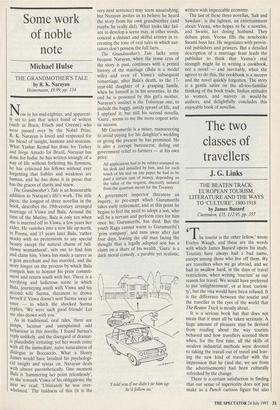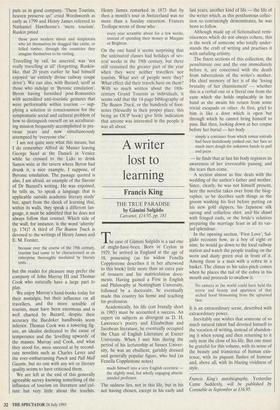The two
classes of travellers
J. G. Links
THE BEATEN TRACK: EUROPEAN TOURISM, LITERATURE AND THE WAYS TO 'CULTURE', 1800-1918 by James Buzard Clarendon, £35, f12.95, pp. 357 The tourist is the other fellow,' wrote Evelyn Waugh, and these are the words with which James Buzard opens his study. Tourists have always had a bad name, except among those who live off them. We are travellers when we go abroad, and we had to swallow hard, in the days of travel restrictions, when writing 'tourism' as our reason for travel. We would have preferred to put 'enlightenment', or at least 'curiosi- ty', but the visa would have been refused. It is the difference between the tourist and the traveller in the eyes of the world that The Beaten Track is mostly about.
It is a serious book but that does not mean that it must all be taken seriously. A huge amount of pleasure may be derived from reading about the way tourists behaved and how travellers scorned them when, for the first time, all the skills of modern industrial methods were devoted to taking the travail out of travel and leav- ing the new kind of traveller with the impression that he (and she, we see from the advertisements) had been culturally refreshed by the change.
There is a certain satisfaction in finding that our sense of superiority does not just make us a Punch cartoon figure but also
puts us in good company. 'These Tourists, heaven preserve us!' cried Wordsworth as early as 1799 and Henry James referred to Nathaniel Hawthorne's 'mere tourism'. Ruskin pitied
those poor modern slaves and simpletons who let themselves be dragged like cattle, or felled timber, through the countries they imagine themselves to be visiting.
Travelling by rail, he asserted, was 'not really travelling at all' (forgetting, Ruskin- like, that 20 years earlier he had himself enjoyed 'an entirely divine railway coupe drive'). We can also, with Buzard, scoff at those who indulge in 'Byronic emulation', Byron having furnished post-Romantics with accredited anti-touristic gestures that were performable within tourism — sup- plying a solution in consciousness for the symptomatic social and cultural problem of how to distinguish oneself on an acculturat- ing mission frequently accomplished in pre- vious years and now simultaneously attempted by 'everyone else'.
I am not quite sure what this means, but I do remember Alfred de Musset leaving George Sand at the Danieli in Venice while he crossed to the Lido to drink Samos wine at the tavern where Byron had drunk it, a nice example, I suppose, of Byronic emulation. The passage quoted is also, I am afraid, an example of the flavour of Dr Buzard's writing. He was enjoined, he tells us, 'to speak a language that is applicable outside academic literary study' but, apart from the shock of learning that, within its walls, they speak a different lan- guage, it must be admitted that he does not always follow that counsel. Which side of the wall, for instance, is the word `alterity' (p. 174)? A third of The Beaten Track is devoted to the writings of Henry James and E. M. Forster,
because over the course of the 19th century, tourism had come to be characterised as an enterprise thoroughly mediated by literary texts ...
but the reader for pleasure may prefer the company of John Murray III and Thomas Cook who naturally have a large part to play.
We enjoy Murray's hand-books today for their nostalgia, but their influence on all travellers, and the more sensible of tourists, must have been enormous and is well charted by Buzard; despite their accuracy the Baedeker handbooks seem inferior. Thomas Cook was a towering fig- ure, an idealist dedicated to the cause of temperance and the 'levelling upwards' of the masses. Murray and Cook, and what they stood for, were sneered at by second- rate novelists such as Charles Lever and the ever-embarrassing Punch and Pall Mall Gazette, but no one with any wit or literary quality seems to have criticised them.
We are left at the end of this generally agreeable survey knowing something of the influence of tourism on literature and cul- ture but very little about the tourists. Henry James remarked in 1873 that by then a month's tour in Switzerland was no more than a Sunday excursion. Frances Trollope wrote of those who
every year scramble about for a few weeks, instead of spending their money at Margate or Brighton.
On the one hand it seems surprising that the unleisured classes had holidays of sev- eral weeks in the 19th century, but there still remained the greater part of the year when they were neither travellers nor tourists. What sort of people were they? What effect did their travels have on them? With so much written about the 18th- century Grand Tourists as individuals, it seems odd that the 14-page bibliography of The Beaten Track, or the hundreds of foot- notes (blessedly in their proper place, this being an OUP book) give little indication that anyone was interested in the people it was all about.



















































 Previous page
Previous page